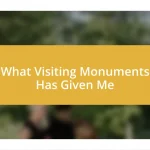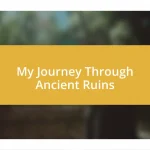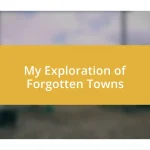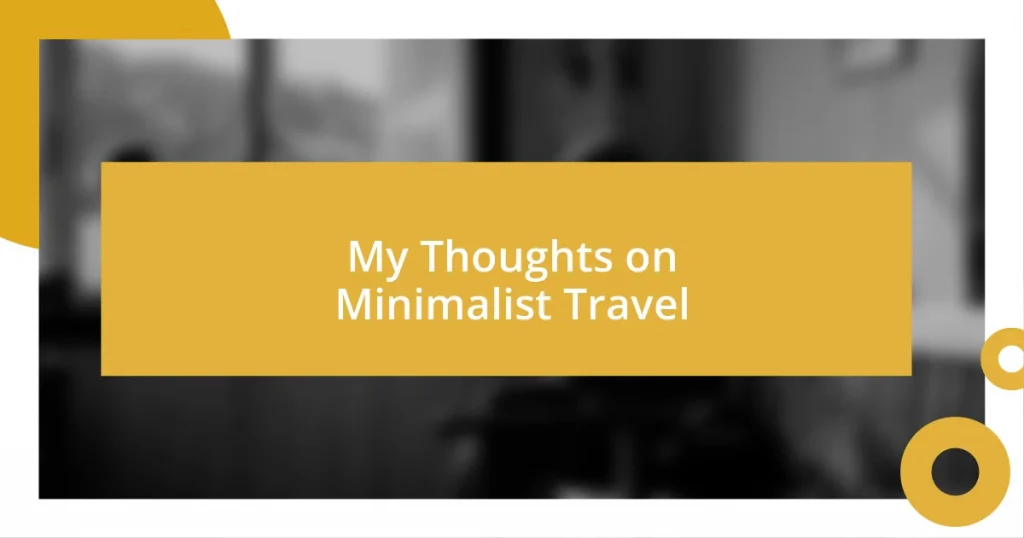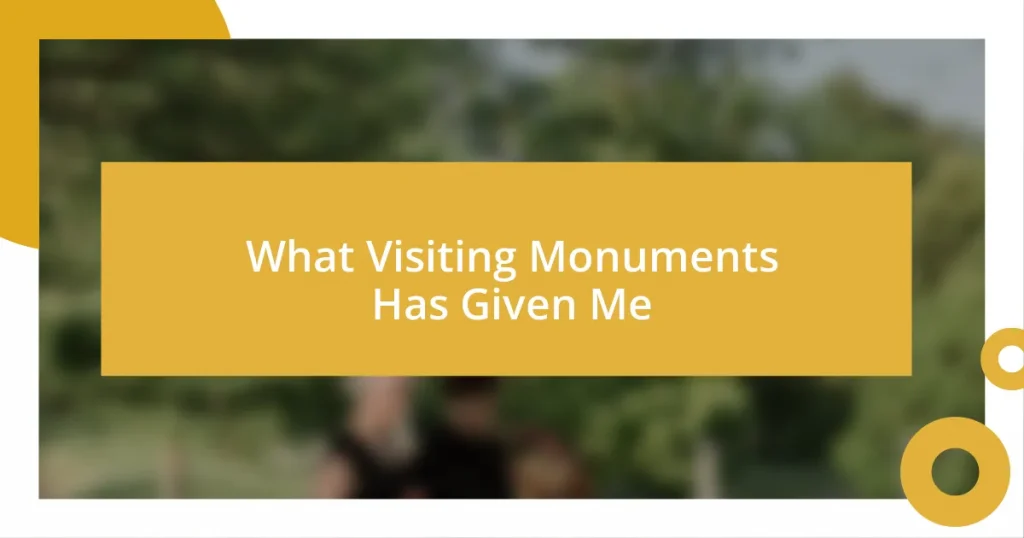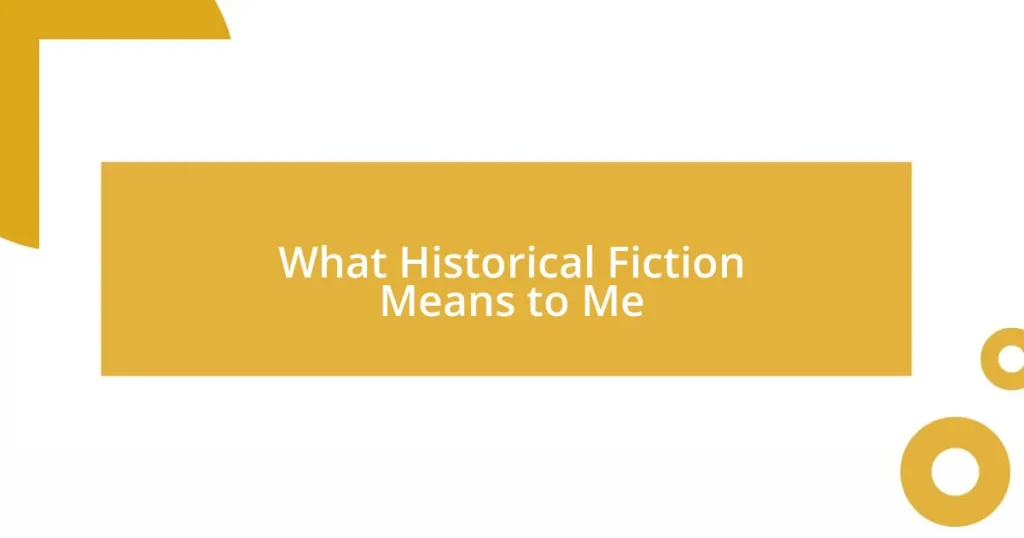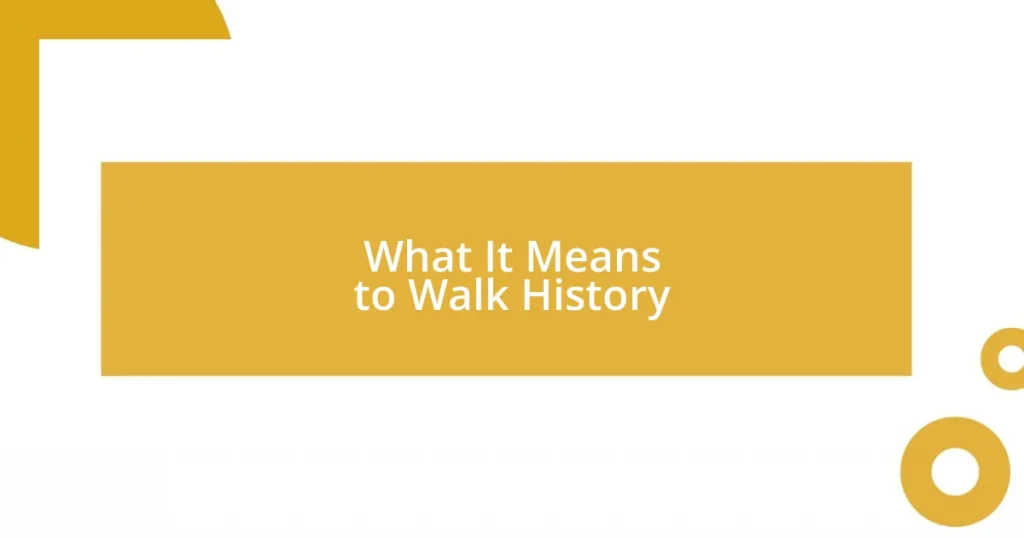Key takeaways:
- Minimalist travel emphasizes simplicity and prioritizes experiences over possessions, leading to deeper connections and richer moments.
- Packing light brings practical benefits such as increased flexibility, sustainability, and cost-effectiveness, allowing for a more spontaneous travel experience.
- Adopting a minimalist mindset encourages a focus on quality experiences, redefines essentials, and promotes the joy of wandering without strict itineraries.
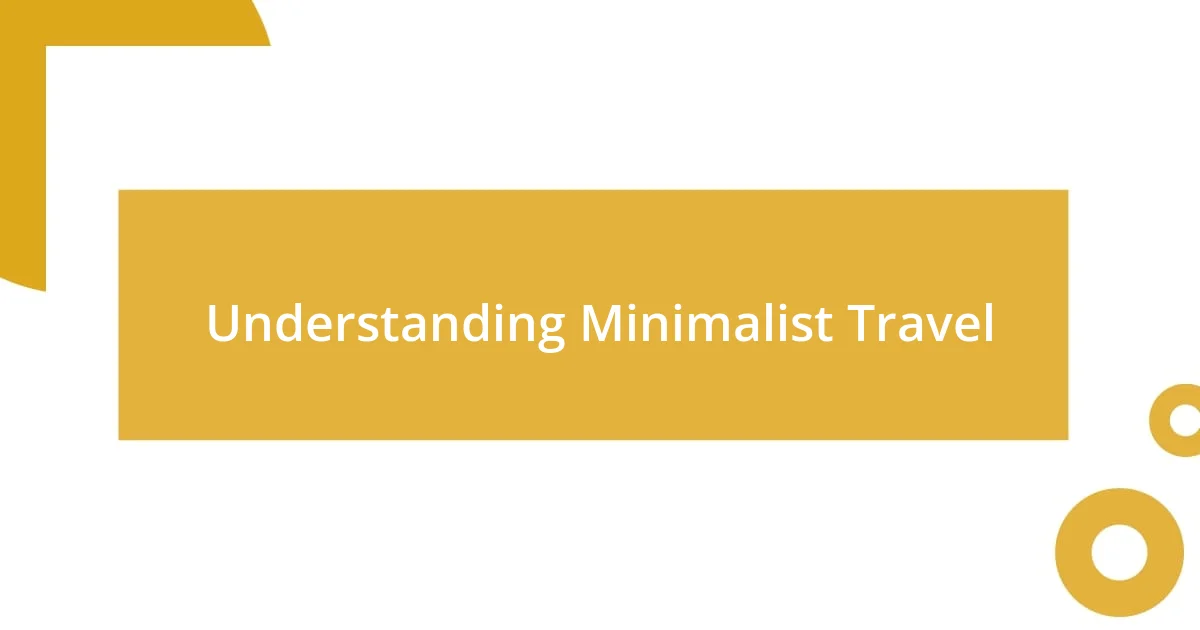
Understanding Minimalist Travel
Minimalist travel is all about embracing simplicity and intentionality in your journeys. I remember my first minimalist trip; it was liberating to pack only a small backpack and head out without the clutter of unnecessary items. Isn’t it refreshing to think that less gear can actually lead to more meaningful experiences?
When you strip down to the essentials, you begin to notice the world around you in a new light. I found that focusing on a few beloved items allowed me to engage more fully with my surroundings. Have you ever realized how a single well-chosen item can spark joy or a memorable moment on the road?
At its core, minimalist travel is a mindset that prioritizes experiences over possessions. I often ask myself how much I really need to enjoy a destination, and the answer usually hinges on the people I meet and the experiences I cherish more than the things I carry. How can your next trip be more about moments and less about stuff?
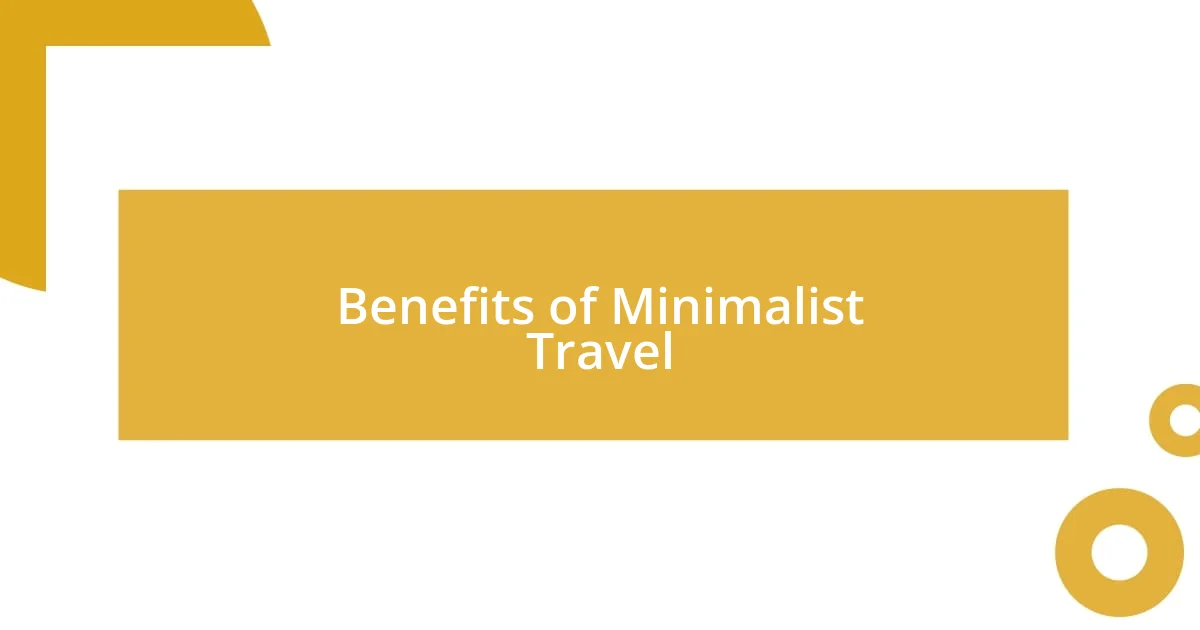
Benefits of Minimalist Travel
Packing light isn’t just practical; it’s also freeing. I recall a trip to a beautiful coastal town where I traveled with only a tote bag. The lack of distractions allowed me to wander into little cafes, connect with locals, and truly immerse myself in the culture. Each moment felt richer, and I realized how much more I appreciated experiences rather than things.
The benefits of minimalist travel extend beyond just emotional enrichment; they also include practical advantages:
- Simplicity: Fewer belongings mean less time spent worrying about logistics.
- Flexibility: With a lighter load, spontaneous changes in plans become less daunting.
- Sustainability: Minimalist travel often leads to more environmentally friendly choices, like using public transport or staying in eco-friendly accommodations.
- Cost-Effectiveness: Traveling with less often reduces baggage fees and encourages budget accommodations, leaving more room for fun activities.
- Focus on Connections: When you carry less, you’re more present and open to meeting new people along your journey.
Each of these benefits reinforces the notion that experiences are far more valuable than anything material.
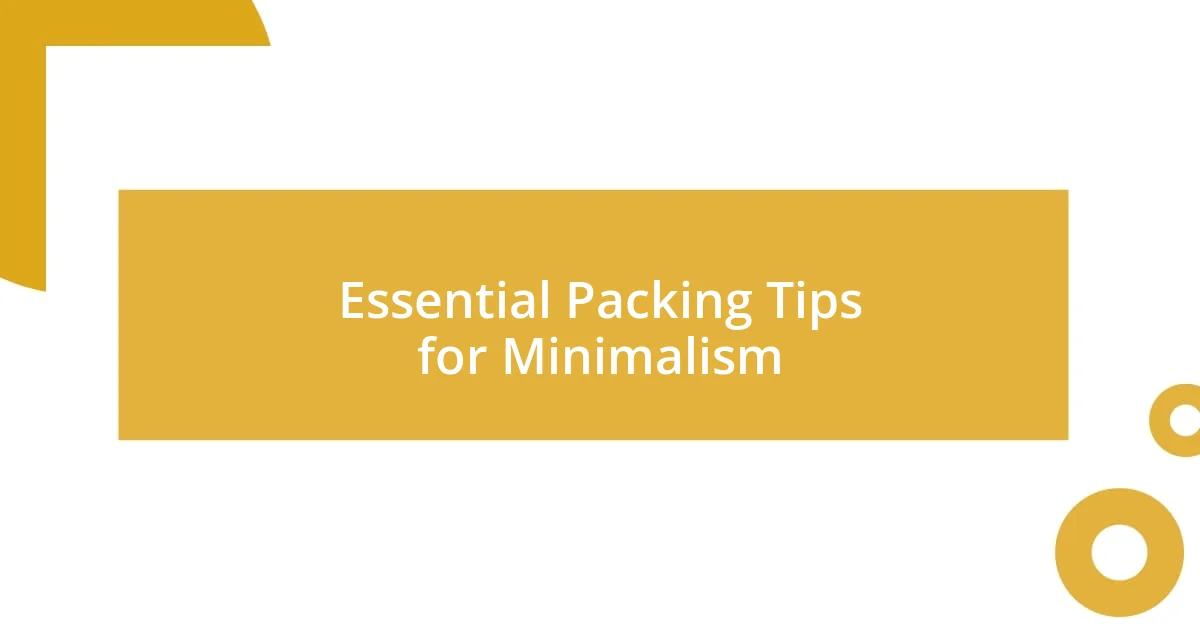
Essential Packing Tips for Minimalism
Packing for a minimalist journey requires a thoughtful approach. When I first embraced minimalist travel, I adopted a rule that served me well: if it doesn’t fit in my carry-on, I don’t take it. For instance, I bring versatile clothing items that can be mixed and matched. Have you considered how a single pair of shoes can be dressed up or down for different occasions?
Another tip is to prepare a packing list before you start. This saves time and helps prevent overpacking. I remember once making a list for a two-week trip and ended up carrying half the items back home unused. It’s astonishing how easy it is to let emotions influence our packing choices, especially when it comes to sentimental items that eventually weigh us down on the road.
Lastly, think about your travel essentials. I like to pack multi-purpose tools, like a travel-sized toiletries kit, to reduce space and maintain simplicity. Each item I carry is purposeful and essential, ensuring that I focus on creating memories instead of managing belongings. What would you choose as your essential gear for an adventure, and how would it change your travel experience?
| Packing Tip | Explanation |
|---|---|
| Versatile Clothing | Select items that can be easily combined to create various outfits. |
| Packing List | Write down what you need in advance to avoid overpacking. |
| Multi-Purpose Items | Choose tools that serve multiple functions to save space. |
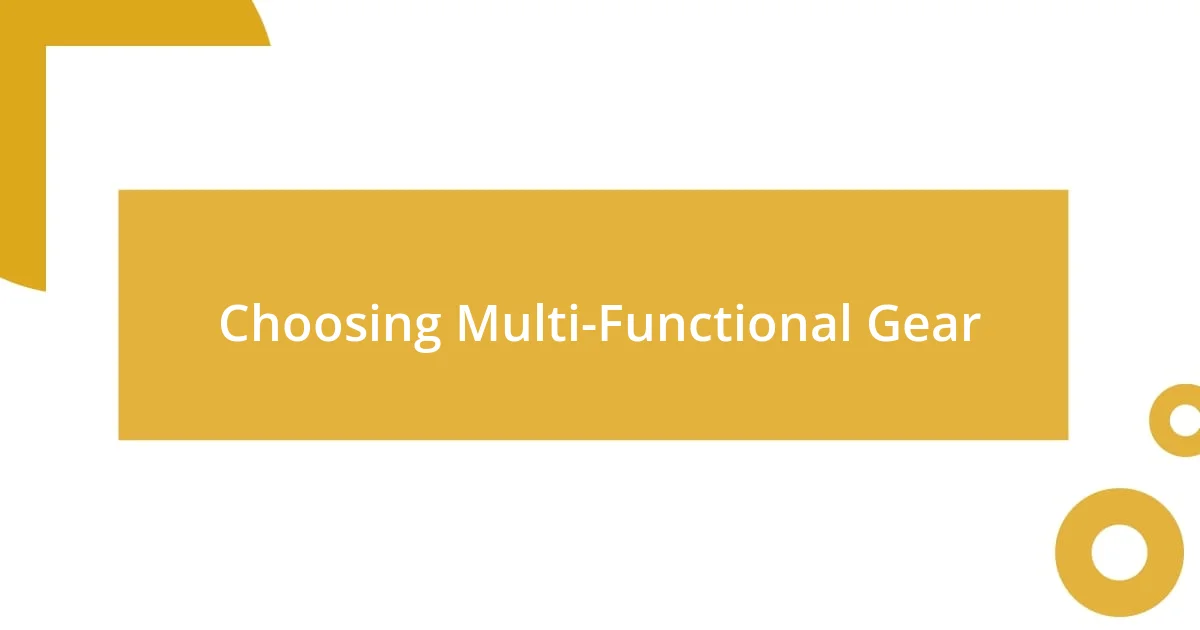
Choosing Multi-Functional Gear
When choosing multi-functional gear, I always prioritize items that offer more than one use. For example, I once traveled with a lightweight jacket that doubled as a pillow. It struck me how this not only saved space but also added comfort during a long flight—who doesn’t appreciate a cozy sleep on the go?
I’ve found that a good backpack can be a game changer too. The one I have features compartments for my laptop, a hydration pack, and even a detachable daypack. This versatility made me feel organized and prepared for anything, whether exploring a new city or hiking a scenic trail. Isn’t it liberating to have everything neatly in one place?
Additionally, I regularly ask myself how each item can enhance my experience. I remember packing a small, portable camping stove for a trip, which allowed me to cook meals while camping and made me feel like a true adventurer. It’s moments like these that make you ponder: if each piece of gear enriches your journey, why not invest in items that serve multiple functions?
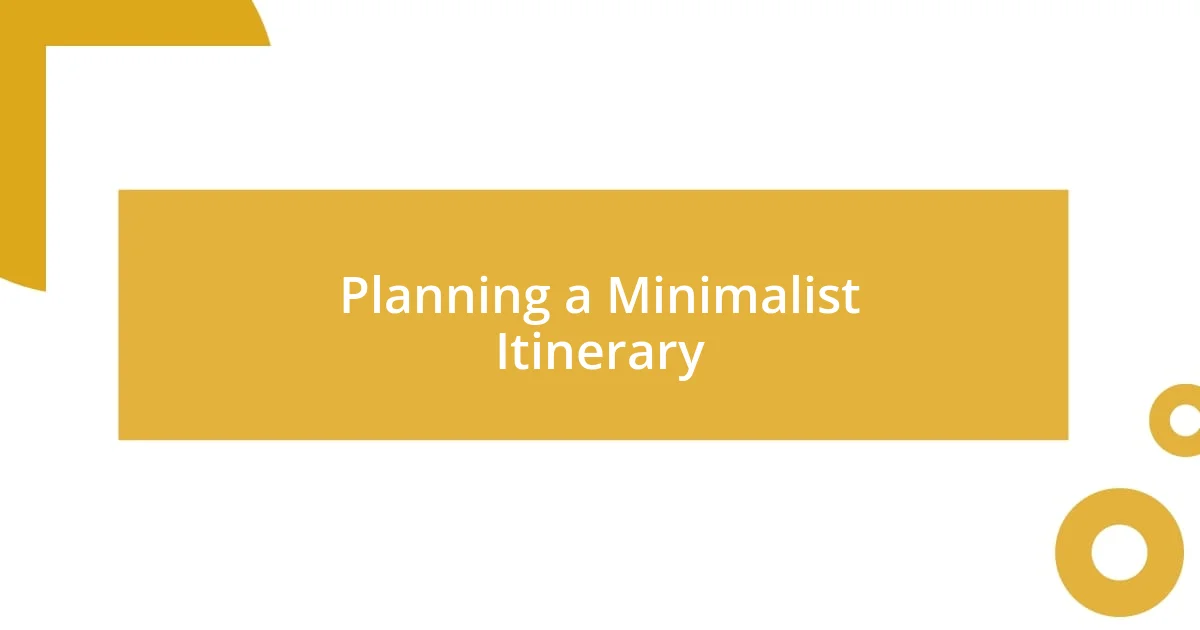
Planning a Minimalist Itinerary
When planning a minimalist itinerary, I always start by narrowing down the destinations. I once felt overwhelming excitement for a trip, cramming too many places into just a week. In hindsight, I realized that fewer stops let me soak in the culture more deeply—after all, isn’t travel about the experiences, not just ticking boxes?
Next, I prioritize my activities carefully. I remember a trip where I over-scheduled myself with tours and attractions, leaving little time to simply wander and explore. By focusing on a few key highlights, I found a balance that allowed for spontaneity, inspiring those unexpected adventures that make traveling so special. Wouldn’t you agree that the best stories often come from unplanned moments?
Lastly, I always consider the pace of my itinerary. I find that building in downtime is crucial; it’s during those quiet moments that I often reflect and recharge. For example, on a recent trip, I carved out a day to relax at a local café, savoring the atmosphere and allowing myself to truly connect with the place. It made me wonder—what would travel feel like if we didn’t rush and allowed ourselves to simply be?
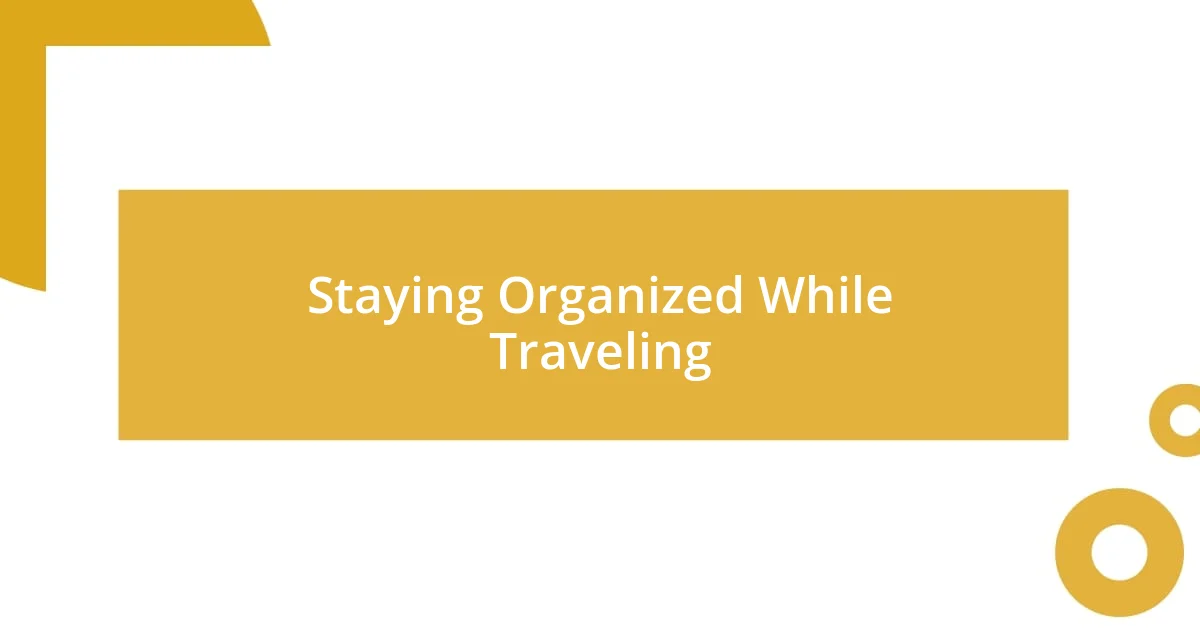
Staying Organized While Traveling
When I travel, staying organized often starts with the packing system I use. I vividly remember a trip where I experimented with packing cubes. Each cube was dedicated to specific categories—clothes, toiletries, electronics. Not only did this help me find what I needed quickly, but it also calmed my mind, allowing me to focus more on my surroundings. Isn’t it amazing how a little organization can reduce stress significantly?
I also find that keeping a digital list on my phone is invaluable. I categorize my tasks and purchases on apps like Trello. On one trip, I had a detailed checklist for everything from essentials to souvenirs. Checking items off as I went made me feel accomplished and ensured I didn’t forget anything important. Isn’t it funny how simple tools can make such a big difference while you’re on the road?
Another tip I swear by is maintaining a travel journal. On a recent getaway, I took the time each evening to jot down my thoughts and experiences. This practice not only kept my memories organized but also allowed me to reflect on each day. There’s something special about capturing those fleeting moments. Have you ever stopped to think about how journaling can create a deeper connection to your travels?
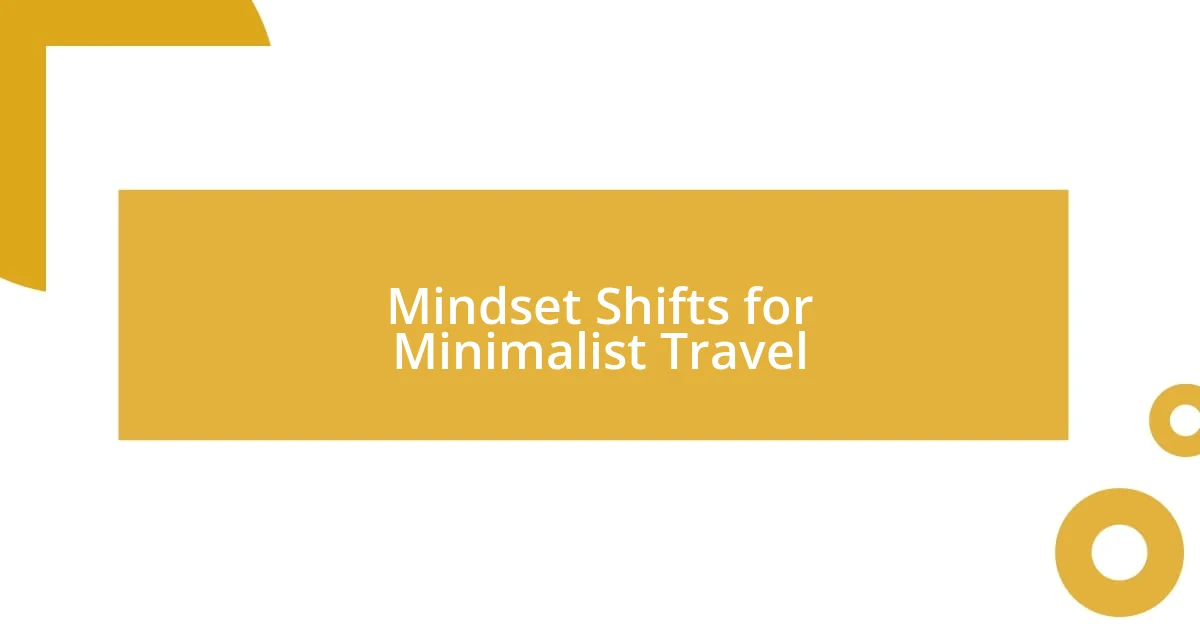
Mindset Shifts for Minimalist Travel
Embracing a minimalist travel mindset often requires a fundamental shift in how I perceive value. I’ve learned to focus on the quality of experiences rather than the quantity of items—like the time I opted to leave my camera behind. I ended up capturing memories with my mind instead of through a lens, which was surprisingly liberating. Doesn’t that make you wonder about the power of simply being present?
I also change how I define essentials. Initially, I thought I needed a large suitcase to carry my “must-haves.” However, after traveling with just a small backpack on a month-long journey, I felt the freedom that comes with shedding excess. I realized that comfort and practicality often outweigh having the latest gadgets or trendy outfits. What would you prioritize if you had to choose only a few treasured items for your travels?
Finally, I’ve discovered that letting go of expectations can be incredibly freeing. On a trip to Portugal, I arrived with a packed itinerary but soon found that my joy came from wandering the cobblestone streets without a destination. Reflecting on that experience, I now recognize that sometimes the most enriching moments arise from unexpected paths. Isn’t it interesting how a shift in mindset can open up a world of possibilities?
